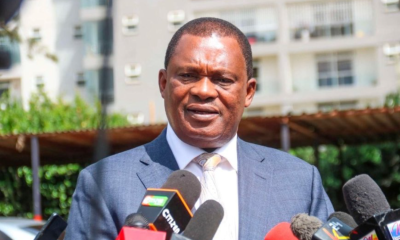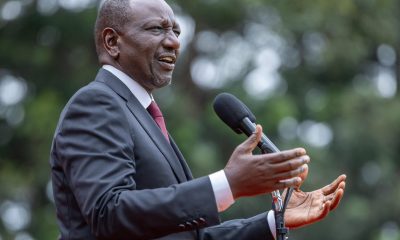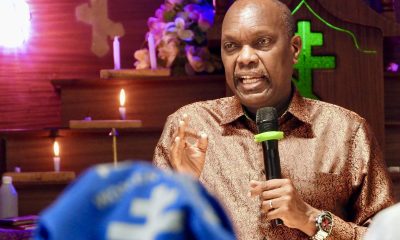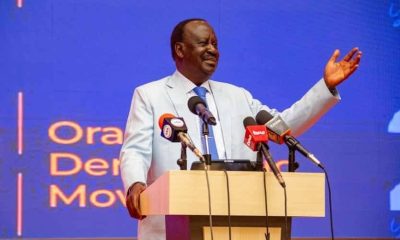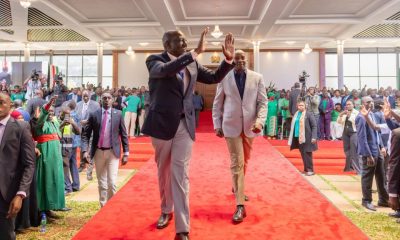Opinion
Ruto’s Political Dilemma: Why He Is Scared of Firing Muturi
Now, Ruto finds himself in Kenyatta’s shoes, facing a rebellious insider who is using government failings as political ammunition.
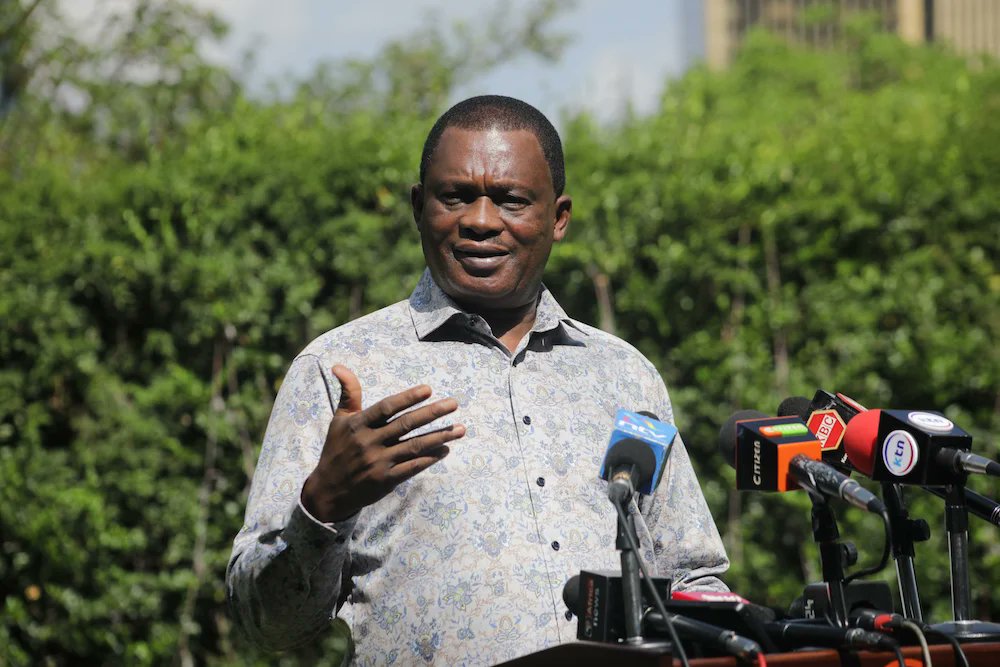
President William Ruto finds himself at a political crossroads with Public Service Cabinet Secretary Justin Muturi, whose criticisms of the administration’s handling of abductions and extrajudicial killings have placed Ruto in a precarious position.
The situation is not just about managing dissent within his government but also about maintaining political support in the volatile Mt Kenya region, where Muturi hails from.
The Core of the Dilemma
Muturi’s outspoken critique against the government, particularly on the sensitive issue of abductions, has made him a divisive figure within the Kenya Kwanza administration. His personal stake in the matter, following the abduction of his son by suspected state agents, lends credibility to his criticisms, resonating with the public and potentially eroding trust in Ruto’s leadership. This situation is complicated by the fact that Muturi’s actions mirror the political tactics Ruto himself used against former President Uhuru Kenyatta, highlighting a potential hypocrisy if Muturi were to be fired.
Implications of Action or Inaction
Firing Muturi: This could alienate Ruto from Mt Kenya East, a region already showing signs of political restlessness following the impeachment of former Deputy President Rigathi Gachagua. Muturi could become a martyr-like figure, rallying opposition and potentially joining forces with anti-Kenya Kwanza factions, thereby intensifying political opposition.
Retaining Muturi: Keeping him in the Cabinet might expose internal divisions within the administration, signaling weakness or lack of control. However, it keeps potential adversaries closer, where they can be monitored and possibly managed, as suggested by political analyst Prof. David Monda. This strategy, however, risks further emboldening Muturi, who might escalate his criticisms unless checked.
Muturi’s Strategic Positioning
Muturi appears acutely aware of his leverage, as evidenced by his absence from key Cabinet meetings, possibly as a tactic to force a decision from Ruto. His recent public demands for an inquiry into abductions and his framing of these actions as a national crisis amplify his position, making his dismissal not just a personnel decision but a political statement.
Public and Political Sentiment
The public, especially in areas affected by these abductions, might view Muturi as a voice of reason within a government perceived to be out of touch or worse, complicit in these human rights violations. Politicians like Kitui Senator Enoch Wambua and Embakasi Central MP Benjamin Gathiru suggest that Muturi’s stance aligns with public sentiment, particularly in Mt Kenya, where support for Ruto could waver further if Muturi is seen as unfairly targeted.
The Cost of Firing Muturi
The biggest risk of firing Muturi is that it could turn him into a political martyr, fueling the growing discontent in the Mt Kenya region. Already, Ruto faces hostility in Mt Kenya West following the impeachment of former Deputy President Rigathi Gachagua. Firing Muturi, who hails from Mt Kenya East, could alienate another key faction of the region, undermining Ruto’s efforts to maintain political dominance.
According to news reports citing a State House insider, the government is reluctant to sack Muturi immediately, fearing that doing so would position him as a hero standing up against government excesses. Muturi’s criticism of abductions resonates with many Kenyans, particularly those who have lost loved ones. The Kenya National Commission on Human Rights (KNCHR) has recorded 89 cases of enforced disappearances since June 2024, with 29 people still missing.
Firing Muturi under these circumstances could backfire, amplifying opposition voices and reinforcing the narrative that Ruto’s government is intolerant of dissent.
A Playbook Ruto Knows Well
Critics argue that Muturi is following the same political strategy that Ruto himself used against former President Uhuru Kenyatta. When Ruto was Deputy President, he frequently criticized Kenyatta’s administration, particularly on economic mismanagement and extrajudicial killings. However, despite the tensions, Kenyatta did not fire Ruto, fearing it would make him a political martyr.
Now, Ruto finds himself in Kenyatta’s shoes, facing a rebellious insider who is using government failings as political ammunition. Muturi’s open defiance, including his absence from the first Cabinet meeting of 2025, suggests he is daring the President to fire him—perhaps as a calculated move to position himself for future political relevance.
Keeping Enemies Close?
Political analysts, including US-based Professor David Monda, argue that Ruto is caught between a rock and a hard place. Firing Muturi could embolden the growing anti-Kenya Kwanza coalition led by Gachagua, while retaining him allows Muturi to continue undermining the administration from within. Ruto’s strategy of keeping his enemies close may be a temporary fix, but it is unlikely to resolve the underlying tensions.
Way Forward
Ruto’s options are limited. Retaining Muturi risks further erosion of public trust and internal cohesion, while firing him could ignite political unrest in Mt Kenya and beyond. Some observers suggest that Ruto may eventually be forced to act if Muturi’s attacks escalate. However, any move against Muturi must be carefully calibrated to avoid alienating key constituencies.
The situation in Mt Kenya remains volatile, and Ruto has already deployed Interior CS Prof. Kithure Kindiki to calm tensions in the region. If the administration regains political ground, Ruto may feel confident enough to dismiss Muturi and replace him with a more loyal figure, such as Kiraitu Murungi.
However, if the hostility persists, firing Muturi could further inflame Mt Kenya East, potentially creating another political headache for Ruto.
In the meantime, Ruto’s administration faces mounting pressure to address the abductions and extrajudicial killings that have fueled Muturi’s defiance. Ignoring these issues will only deepen the crisis and provide more fodder for Ruto’s critics. As Machakos Deputy Governor Francis Mwangangi aptly put it, Muturi is not against the government but against the bad actions of individuals within it. Addressing these concerns head-on may be the only way for Ruto to navigate this political minefield.
Ruto’s handling of the Muturi dilemma will be a defining moment for his presidency. Firing Muturi risks alienating Mt Kenya East and giving his critics more ammunition. Keeping him in government exposes internal divisions and weakens the credibility of his administration.
Ultimately, Ruto’s decision will depend on whether he can contain the growing discontent in Mt Kenya. If he manages to stabilize the region politically, Muturi’s exit may become inevitable. But for now, the President remains stuck between a rock and a hard place, trying to balance political survival with governance credibility.
Kenya Insights allows guest blogging, if you want to be published on Kenya’s most authoritative and accurate blog, have an expose, news TIPS, story angles, human interest stories, drop us an email on [email protected] or via Telegram
-

 Grapevine6 days ago
Grapevine6 days agoAlleged Male Lover Claims His Life Is in Danger, Leaks Screenshots and Private Videos Linking SportPesa CEO Ronald Karauri
-

 Lifestyle1 week ago
Lifestyle1 week agoThe General’s Fall: From Barracks To Bankruptcy As Illness Ravages Karangi’s Memory And Empire
-

 Grapevine2 days ago
Grapevine2 days agoRussian Man’s Secret Sex Recordings Ignite Fury as Questions Mount Over Consent and Easy Pick-Ups in Nairobi
-

 Investigations2 weeks ago
Investigations2 weeks agoEpstein Files: Sultan bin Sulayem Bragged on His Closeness to President Uhuru Then His Firm DP World Controversially Won Port Construction in Kenya, Tanzania
-

 News2 weeks ago
News2 weeks agoAUDIT EXPOSES INEQUALITY IN STAREHE SCHOOLS: PARENTS BLED DRY AS FEES HIT Sh300,000 AGAINST Sh67,244 CAP
-

 Business2 weeks ago
Business2 weeks agoKRA Can Now Tax Unexplained Bank Deposits
-

 Investigations1 week ago
Investigations1 week agoEpstein’s Girlfriend Ghislaine Maxwell Frequently Visited Kenya As Files Reveal Local Secret Links With The Underage Sex Trafficking Ring
-

 News1 week ago
News1 week agoState Agency Exposes Five Top Names Linked To Poor Building Approvals In Nairobi, Recommends Dismissal After City Hall Probe



